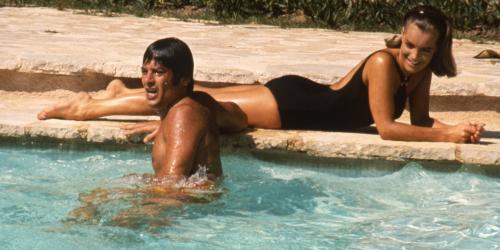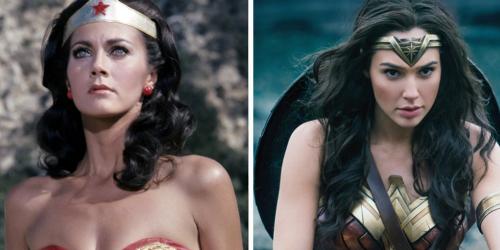How did you meet Paul Vecchiali?
He offered me a role in Return to Mayerling, shot in 2014. It is a rather late meeting in reality. Paul told me he had thought of me a long time ago to play a role in a soap opera for TV, but it had not happened. He had me in a corner of my head. And he is very faithful to the actresses ...
What attracts you to its cinema?
Paul has produced magnificent films, including Women Women of course, and all his collaborations with Hélène Surgère. And then I was very seduced by the person. He really knows what he wants on a set, he has already seen everything: editing, cutting, making the film. It is both very applied and very free. Of a crazy freedom. He loves taking risks, trying things, tinkering, inventing movies with very little money. I think he is younger than most young people.
Do you think that this freedom is lacking in French cinema?
People too often encumber themselves with structures, with questions of production, with money. Paul is more clever than that: he passes between the stitches, he tinkers. It constituted a small world of his, an autonomous studio, which I find admirable. His films are filmed in his home in the South of France.
It also has a special and very beautiful relationship with the actresses. What do we feel, filmed by Paul Vecchiali?
That's wonderful. There are only old women in Le Ducre. But it's never sad, never nostalgic. Annie Cordy, Françoise Lebrun, all the actresses are magnified by his camera. And it's swollen to make such a film with old women! There is life, desire in her way of filming the actresses. The cinema is violent with older actors. We put people in the trash. But not Vecchiali. He is generous.
Rumor has it that you refused to play in Michael Haneke's Love movie. Why did you refuse this role? Is it precisely this relationship to age, this violence of the cinema you evoke?
No, it's a lot more complicated than that. I did not refuse the film. I had read the script and it scared me. Show this degradation, this naked woman in a wheelchair taking a shower ... I was not at ease. I think I prefer life to be approached by positive things.
You talked about a late and happy meeting with Paul Vecchiali. Are you keeping today the same capacity for wonder, the same thirst for discovery as for your beginnings?
Yes of course. I remain attentive to everything. Recently I had an artistic thunderbolt for Gabriel Abrantes (a young American-Portuguese director, editor's note). It is awesome. I shot in his film Pan, Crying not, where I incarnated an ambassador of France in Afghanistan, on camel back. He is also very free in his way of turning, without budget but with crazy ideas. If I do this job, it is to meet people, to take risks. Not to freeze an image, preserve a brand.
You have made the bet of the youth since the years 2000, turning for audacious authors such Pedro Costa, Vincent Dietschy, Mia Hansen-Løve ...
I always wanted to stay active, alert, listening to what is being created. But I do not work with this kind of sharp writers, I like mixing genres, going to different projects, switching from a demanding cinema to a more consensual cinema. I do not have a choice anyway. It is too fragile a profession. You have to be there, show yourself. If you are not seen for two years, you are replaced. I've always been afraid of disappearing from the market.
You've had a little bit of a hollow in your career in the 1980s. Does your awareness of the fragility of the actress's profession come from this period?
I worked a lot, especially for television. And then the rhythm has changed. I had children, and I reinvented myself. I worked a lot with my husband (contemporary music composer Georges Aperghis, ed.). An experimental theater group was set up in Bagnolet. I was part of the troupe for eight years.
We saw each other every day, we repeated, we went on tour to defend our avant-garde shows. That's when I was a little forgotten. I had changed jobs too: I was no longer the young first. I had a hard time suggesting other images of me. And then the trigger came through a small role in the movie Venus Beauty. I immediately chained with the film of Raoul Ruiz, Le Temps retrouvé (released in 1999, ed), and there my career was relaunched.
About Franju, who revealed you in 1960 with Faceless Eyes, you once said you were afraid your cinema would be forgotten. Whether you are afraid of people's "forgetfulness". Do you still have that feeling?
Yes, that's my scare. So many things happen every day, with the Internet, social networks. Everything is accelerating. Young people are cluttered with information and I am afraid of this ability to forget. On You Tube, I recently saw The First Night, a sublime short film by Franju. The version on the Internet is deplorable, the image barely lookable.
It would have to stand out this film, restore it, do everything possible so that it is not forgotten. We must fight. Next month, a Manchester film festival invited me to talk about Faceless Eyes before the public. I will go without hesitation: it is necessary to make live the cinema.

The Darkness of Paul Vecchiali, with Catherine Deneuve, Edith Scob. Released October 5th.


